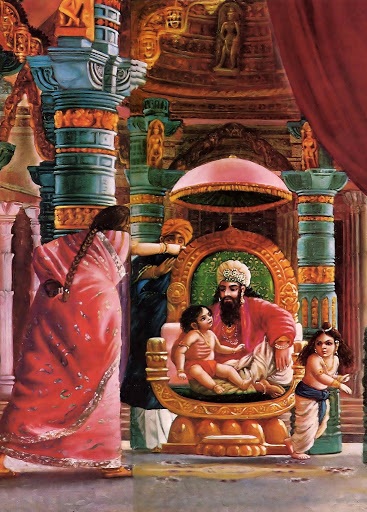 Dhruva was an adorable little boy. He saw his half-brother, Uttama, sitting and playing on the lap of their father, King Uttanapada. He too desired to climb on to the lap of Uttanapada. But his step-mother could hardly tolerate that. She gave a tight slap to him declaring that he was unfit to sit on the lap of the King as he was not born to her but to another queen. Crest-fallen and deeply hurt, the little kid, with his eyes full of tears, ran to his mother. His mother, a highly noble lady, consoled him and advised that he should achieve something so that people look at him with awe. The little Dhruva left the royal palace and went away to a distant forest. He met with a group of Sages in the forest and narrated to them his soulful story. They advised him to meditate on Vishnu. So, he embarked on a very austere and rigorous course of meditation. Regretting heavily the developments, the King and all his retinue, his mother, the queen and all his family implored that he should give up his askesis and return home. The King was even ready to abdicate the throne and promised to coronate him. But Dhruva was unrelenting. He did not succumb to the temptations and was uncompromising in his resolve. He pursued his meditation with greater vigor. He meditated on Vishnu, the Ultimate. Continue reading
Dhruva was an adorable little boy. He saw his half-brother, Uttama, sitting and playing on the lap of their father, King Uttanapada. He too desired to climb on to the lap of Uttanapada. But his step-mother could hardly tolerate that. She gave a tight slap to him declaring that he was unfit to sit on the lap of the King as he was not born to her but to another queen. Crest-fallen and deeply hurt, the little kid, with his eyes full of tears, ran to his mother. His mother, a highly noble lady, consoled him and advised that he should achieve something so that people look at him with awe. The little Dhruva left the royal palace and went away to a distant forest. He met with a group of Sages in the forest and narrated to them his soulful story. They advised him to meditate on Vishnu. So, he embarked on a very austere and rigorous course of meditation. Regretting heavily the developments, the King and all his retinue, his mother, the queen and all his family implored that he should give up his askesis and return home. The King was even ready to abdicate the throne and promised to coronate him. But Dhruva was unrelenting. He did not succumb to the temptations and was uncompromising in his resolve. He pursued his meditation with greater vigor. He meditated on Vishnu, the Ultimate. Continue reading
Tag Archives: seen
Consciousness, Ego and Self-knowledge
Introduction
Verse 3.42 of the Bhagavad Gita says that the sense organs are superior to the gross body, the mind is superior to the sense organs, the intellect is superior to the mind and the Atma is superior to the intellect. Superiority also refers to subtlety. Our interest is in the mind, the intellect and finally in the Atma. There are five fundamental elements called panchabhutas. They are space, air, earth, water and fire. The subtle body is made of panchbhutas in their primary or nascent forms. When the panchabhutas undergo a process of compounding among themselves, the gross or physical body emerges. The mind and the intellect belong to the category of subtle body, i.e., made of the five elements in primary form. The Atma is beyond the panchabhutas because It is not a thing or physical entity.
Consciousness
We all know that we are a conscious entity. We also feel so. We are also certain that consciousness is different from the gross body. However we are not so sure whether the consciousness is different from the mind because consciousness ordinarily gets mixed up with the mind. Vedanta says that the consciousness is different from the mind. It is based on the axiom that the subject (observer) is different from the object (observed). This is Seer-Seen discrimination (Drg Drisya Viveka). Continue reading
